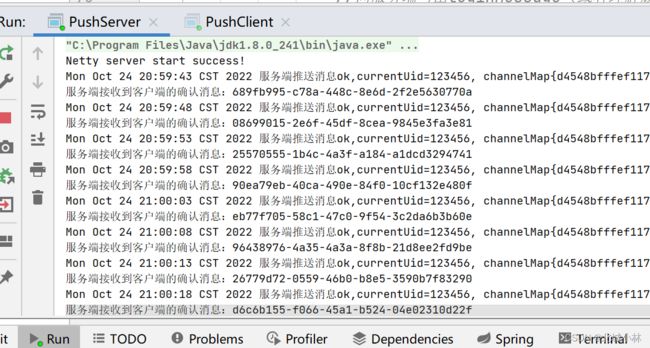【Netty】四、Netty服务端推送消息到客户端实现消息个性化推送
Netty服务端推送消息到客户端
- 一、 Netty服务端推送消息到客户端
-
- 需求:
- 应用场景
- 二、服务端代码
-
- PushServer
- PushServerHandler
- PushAckHandler
- 三、服务端代码
-
- PushClient
- PushClientHandler
- 四、测试
-
- 客户端发送消息
- 服务端接受消息
一、 Netty服务端推送消息到客户端
需求:
1、服务端从redis或数据库等存储层获取到要推送的消息;
2、服务端把获取到的消息主动推送给客户端(只要查询到了数据就推送给客户端);
3、如果有多个客户端连接到了服务端,要区分客户端,不同客户端发送不同的消息;
4、客户端接收到消息后给服务端一个应答;
5、服务端接收到应答之后,对消息状态进行修改,表示该消息已经处理;
应用场景
1、个性化推送,可以千人千面,女性用户可以推送化妆品优惠活动消息,男性用户可以推送电子科技类产品消息;
2、每个客户端(比如手机App),他们首先会登录,登录后有用户的id等唯一业务参数值,用户登录成功后,可以建立一个与netty服务端的长连接并向服务端写出一条信息,信息里面带上用户id等唯一业务参数值;
3、服务端收到客户端的用户id后,可以用一个全局的Map存放起来:
Map
Key: channelId, value: (key: userId, value: Channel)
4、然后服务端启动netty的定时任务,每隔多久从redis或数据库等存储层查询出业务数据,并把数据推送给对应的客户端;
5、如果连接channel断开了,把全局Map中的channel移除;
二、服务端代码
PushServer
import com.mytest.push.handler.PushAckHandler;
import com.mytest.push.handler.PushServerHandler;
import io.netty.bootstrap.ServerBootstrap;
import io.netty.channel.ChannelFuture;
import io.netty.channel.ChannelFutureListener;
import io.netty.channel.ChannelInitializer;
import io.netty.channel.nio.NioEventLoopGroup;
import io.netty.channel.socket.nio.NioServerSocketChannel;
import io.netty.channel.socket.nio.NioSocketChannel;
import io.netty.handler.codec.serialization.ClassResolvers;
import io.netty.handler.codec.serialization.ObjectDecoder;
import io.netty.handler.codec.serialization.ObjectEncoder;
import io.netty.handler.timeout.IdleStateHandler;
import java.util.concurrent.TimeUnit;
/**
* 服务端向客户端推送消息
*
* 需求:
* 1、服务端从redis或数据库等存储层获取到要推送的消息;
* 2、服务端把获取到的消息主动推送给客户端(只要查询到了数据就推送给客户端);
* 3、如果有多个客户端连接到了服务端,要区分客户端,不同客户端发送不同的消息;
* 4、客户端接收到消息后给服务端一个应答;
* 5、服务端接收到应答之后,对消息状态进行修改,表示该消息已经处理;
*/
public class PushServer {
private static final int PORT = 6868;
public static void main(String[] args) {
PushServer pushServer = new PushServer();
pushServer.start();
}
private void start() {
ServerBootstrap serverBootstrap = new ServerBootstrap();
NioEventLoopGroup boosGroup = new NioEventLoopGroup(1);
NioEventLoopGroup workGroup = new NioEventLoopGroup();
serverBootstrap.group(boosGroup, workGroup);
serverBootstrap.channel(NioServerSocketChannel.class);
serverBootstrap.childHandler(new ChannelInitializer<NioSocketChannel>() {
protected void initChannel(NioSocketChannel ch) {
//ch.pipeline().addLast(new LoggingHandler(LogLevel.INFO));
ch.pipeline().addLast(new ObjectEncoder());
ch.pipeline().addLast(new ObjectDecoder(Integer.MAX_VALUE, ClassResolvers.cacheDisabled(null)));
ch.pipeline().addLast(new IdleStateHandler(30, 0, 0, TimeUnit.SECONDS));
ch.pipeline().addLast(PushServerHandler.INSTANCE);
ch.pipeline().addLast(PushAckHandler.INSTANCE);
}
});
ChannelFuture channelFuture = serverBootstrap.bind(PORT).addListener((ChannelFutureListener) future -> {
if (future.isSuccess()) {
System.out.println("Netty server start success!");
} else {
System.out.println("Netty server start fail!");
}
});
try {
channelFuture.channel().closeFuture().sync();
} catch (InterruptedException e) {
e.printStackTrace();
}
}
}
PushServerHandler
import com.mytest.codec.LoginMessage;
import com.mytest.codec.PushAckMessage;
import com.mytest.codec.PushMessage;
import io.netty.channel.Channel;
import io.netty.channel.ChannelHandler;
import io.netty.channel.ChannelHandlerContext;
import io.netty.channel.ChannelInboundHandlerAdapter;
import io.netty.handler.timeout.IdleState;
import io.netty.handler.timeout.IdleStateEvent;
import java.util.Date;
import java.util.Map;
import java.util.UUID;
import java.util.concurrent.ConcurrentHashMap;
import java.util.concurrent.TimeUnit;
@ChannelHandler.Sharable
public class PushServerHandler extends ChannelInboundHandlerAdapter {
public static final PushServerHandler INSTANCE = new PushServerHandler();
//key = channelID, value =(key:uid, value:channel)
private static final Map<String, Map<String, Channel>> channelMap = new ConcurrentHashMap<String, Map<String, Channel>>();
@Override
public void channelRead(ChannelHandlerContext ctx, Object msg) throws Exception {
Channel channel = ctx.channel();
String channelId = channel.id().asLongText();
Map<String, Channel> uidMap = new ConcurrentHashMap<String, Channel>();
//如果是 LoginMessage
if (msg instanceof LoginMessage) {
LoginMessage loginMessage = (LoginMessage) msg;
//当前客户端登录的 用户id --> 当前的channel
uidMap.put(loginMessage.getUid(), channel);
channelMap.put(channelId, uidMap);
// 每一条新连接,都是5秒之后发消息
ctx.executor().scheduleAtFixedRate(() -> {
String uid = loginMessage.getUid();
//这样就是每个客户端发送每个客户端的消息
Channel ch = channelMap.get(channelId).get(uid);
if (ch != null) {
//TODO 可以根据uid查询业务数据,然后把业务数据封装成消息推送给客户端 (业务查询省略)
PushMessage pushMessage = new PushMessage();
pushMessage.setMessageId(UUID.randomUUID().toString());
pushMessage.setContent("尊敬的"+channelId+"童鞋,鉴于你2020年第二季度的卓越表现,公司奖励你1万元,于下月发放,期望再接再厉");
pushMessage.setTimestamp(System.currentTimeMillis());
pushMessage.setExt(String.valueOf(uid));
ch.writeAndFlush(pushMessage);
}
System.out.println(new Date() + " 服务端推送消息ok,currentUid=" + uid + ", channelMap" + channelMap);
}, 5, 5, TimeUnit.SECONDS);
}
//如果是 LoginMessage
if (msg instanceof PushAckMessage) {
PushAckMessage pushAck = (PushAckMessage) msg;
System.out.println("服务端接收到客户端的确认消息:" + pushAck.getMessageId());
}
}
@Override
public void userEventTriggered(ChannelHandlerContext ctx, Object evt) throws Exception {
//空闲状态的事件
if (evt instanceof IdleStateEvent) {
IdleStateEvent event = (IdleStateEvent) evt;
if (event.state().equals(IdleState.READER_IDLE)) {
String channelId = ctx.channel().id().asLongText();
channelMap.remove(channelId);
// 心跳包丢失,10秒没有收到客户端心跳 (断开连接)
ctx.channel().close().sync();
System.out.println("已与 "+ctx.channel().remoteAddress()+" 断开连接");
}
}
}
@Override
public void channelInactive(ChannelHandlerContext ctx) throws Exception {
String channelId = ctx.channel().id().asLongText();
channelMap.remove(channelId);
}
@Override
public void exceptionCaught(ChannelHandlerContext ctx, Throwable cause) throws Exception {
System.err.println(cause.getMessage());
}
}
PushAckHandler
import com.mytest.codec.PushAckMessage;
import io.netty.channel.ChannelHandler;
import io.netty.channel.ChannelHandlerContext;
import io.netty.channel.SimpleChannelInboundHandler;
@ChannelHandler.Sharable
public class PushAckHandler extends SimpleChannelInboundHandler<PushAckMessage> {
public static final PushAckHandler INSTANCE = new PushAckHandler();
@Override
protected void channelRead0(ChannelHandlerContext ctx, PushAckMessage pushAck) {
System.out.println("服务端接收到客户端的确认消息:" + pushAck.getMessageId());
//TODO 更新消息状态 (业务处理,暂时省略)
}
}
三、服务端代码
PushClient
import com.mytest.codec.LoginMessage;
import com.mytest.push.handler.PushClientHandler;
import io.netty.bootstrap.Bootstrap;
import io.netty.channel.ChannelFuture;
import io.netty.channel.ChannelInitializer;
import io.netty.channel.nio.NioEventLoopGroup;
import io.netty.channel.socket.nio.NioSocketChannel;
import io.netty.handler.codec.serialization.ClassResolvers;
import io.netty.handler.codec.serialization.ObjectDecoder;
import io.netty.handler.codec.serialization.ObjectEncoder;
import io.netty.handler.timeout.IdleStateHandler;
import io.netty.util.internal.StringUtil;
import java.util.Scanner;
import java.util.concurrent.TimeUnit;
/**
* 客户端接收服务端推送的消息
* 需求:
* 1、服务端从redis或数据库等存储层获取到要推送的消息;
* 2、服务端把获取到的消息主动推送给客户端(只要查询到了数据就推送给客户端);
* 3、如果有多个客户端连接到了服务端,要区分客户端,不同客户端发送不同的消息;
* 4、客户端接收到消息后给服务端一个应答;
* 5、服务端接收到应答之后,对消息状态进行修改,表示该消息已经处理;
*/
public class PushClient {
private static final String HOST = "127.0.0.1";
private static final int PORT = 6868;
public static void main(String[] args) throws Exception {
//假设用户已经登录,登录消息
LoginMessage loginMessage = new LoginMessage();
loginMessage.setUid("1000");
PushClient pushClient = new PushClient();
pushClient.start(loginMessage);
}
private void start(LoginMessage loginMessage) throws Exception {
Bootstrap bootstrap = new Bootstrap();
NioEventLoopGroup group = new NioEventLoopGroup();
bootstrap.group(group);
bootstrap.channel(NioSocketChannel.class);
bootstrap.handler(new ChannelInitializer<NioSocketChannel>() {
@Override
protected void initChannel(NioSocketChannel ch) {
//ch.pipeline().addLast(new LoggingHandler(LogLevel.INFO));
ch.pipeline().addLast(new ObjectEncoder());
ch.pipeline().addLast(new ObjectDecoder(Integer.MAX_VALUE, ClassResolvers.cacheDisabled(null)));
ch.pipeline().addLast(new IdleStateHandler(0, 10, 0, TimeUnit.SECONDS));
ch.pipeline().addLast(PushClientHandler.INSTANCE);
}
});
//连netty服务端
ChannelFuture channelFuture = bootstrap.connect(HOST, PORT).sync();
if (channelFuture.isSuccess()) {
System.out.println("Connect netty server 成功, 请输入用户ID:");
//写出登录信息
Scanner scanner = new Scanner(System.in);
for (;;) {
String uid = scanner.nextLine();
if (!StringUtil.isNullOrEmpty(uid)) {
loginMessage.setUid(uid); //业务参数
//向服务端写出loginMessage(或者理解成向服务端注册当前app客户端)
channelFuture.channel().writeAndFlush(loginMessage);;
break;
}
}
}
channelFuture.channel().closeFuture().sync();
}
}
PushClientHandler
import com.mytest.codec.PushAckMessage;
import com.mytest.codec.PushMessage;
import io.netty.channel.ChannelHandler;
import io.netty.channel.ChannelHandlerContext;
import io.netty.channel.SimpleChannelInboundHandler;
import io.netty.handler.timeout.IdleState;
import io.netty.handler.timeout.IdleStateEvent;
import io.netty.util.AttributeKey;
import java.util.Date;
@ChannelHandler.Sharable
public class PushClientHandler extends SimpleChannelInboundHandler<PushMessage> {
public static final PushClientHandler INSTANCE = new PushClientHandler();
@Override
public void channelActive(ChannelHandlerContext ctx) throws Exception {
ctx.channel().attr(AttributeKey.newInstance("uid")).set(100);
//TODO 重连
}
@Override
protected void channelRead0(ChannelHandlerContext ctx, PushMessage msg) {
PushMessage message = (PushMessage) msg;
System.out.println(new Date() + " 接收到的消息:" + message);
//发送消息确认
PushAckMessage pushAck = new PushAckMessage();
pushAck.setMessageId(msg.getMessageId());
pushAck.setTimestamp(System.currentTimeMillis());
ctx.channel().writeAndFlush(pushAck);
}
@Override
public void userEventTriggered(ChannelHandlerContext ctx, Object evt) throws Exception {
if (evt instanceof IdleStateEvent) {
if (((IdleStateEvent) evt).state() == IdleState.WRITER_IDLE) {
ctx.writeAndFlush("ping");
}
}
}
}

